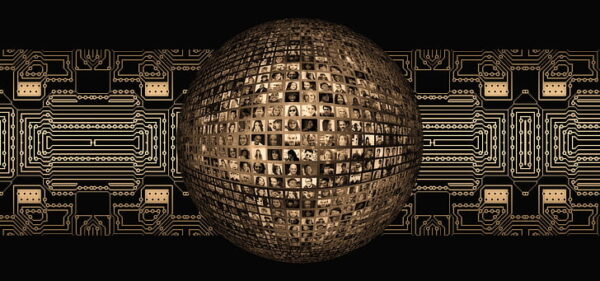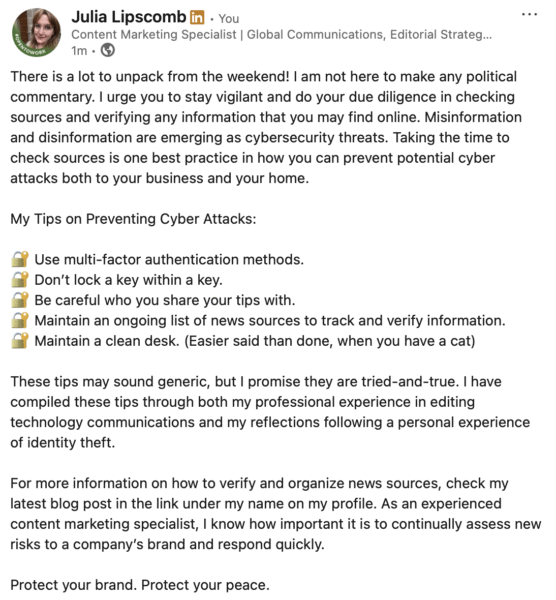There is a lot to unpack from the weekend! Reading your news sources’ bibliographies and crafting a bibliography of your own is necessary for verifying information and preventing cyberattacks.
Overview
Does it feel like there is too much noise online? Across any digital platforms you may use, you will find an endless barrage of user-generated information circulating far too quickly on various websites, blog posts, LinkedIn posts, YouTube videos, Meta posts, X posts, TikTok reels, Instagram stories and reels, Threads comments, Snapchat stories, WhatsApp messages and stories, your group chats, and more. How can we make sense of the noise?

The problem isn’t only trying to keep up with it all. It’s impossible to review, read, or watch everything you review online. A new problem emerges: how do you verify what you find online and confirm what is true?
In this blog post, you will find a brief news report, tips on preventing cyber attacks, a new definition of the featured word “bibliography,” and a bibliography for further reading. In truth, we won’t be able to find all of the answers to a developing story. We must do our due diligence to prevent the flow of inaccuracies, whether by accident or design.
Brief News Report
Over the weekend, the US launched attacks on Iran targeting nuclear facilities outside of Tehran. President Trump addressed the nation in a State of the Union on Saturday. (Recording of the live broadcast by CBS is available on YouTube). That same day, the Department of Homeland Security issued a bulletin summarizing the threat to the United States. In addition to fears of nuclear warfare, the bulletin includes a warning of potential threats of cyber weapons of mass destruction targeting people through the digital world:
Low-level cyber attacks against US networks by pro-Iranian hacktivists are likely, and cyber actors affiliated with the Iranian government may conduct attacks against US networks.
Cited text as it appears in the National Terrorism Advisory System Bulletin issued by Department of Homeland Security on June 22, 2025
Please note that this is a developing story. I will note that I cannot verify what is meant by “pro-Iranian hacktivists” in the above passage. Upon further research, it is unclear whether Iran will retaliate and what form that will take (See: Hernandez, NPR). This is a developing story. You will find the latest on CNN.
Tips on Preventing Cyber Attacks
Regardless of the origin and intent of hackers, I am including the bulletin as a reminder to stay vigilant both at work and at home. In the right sidebar of the bulletin, you will find “Resources to Stay Safe” which includes a short list of ways to report potential threats and tools and to learn more about cybersecurity best practices.

A cybersecurity attack, whether targeted at a company or an individual, can have devastating costs and consequences. One year ago, IBM released its annual Cost of a Data Breach Report. Through analyzing reports on data breaches experienced by 604 organizations globally between March 2023 and February 2024, the report found that the global average cost of a data breach reached $4.88 million in 2024, an increase of 10% over the prior year.
Cyber attacks can also cause irrefutable damage to a company’s brand by destroying the trust and loyalty of clients, customers, employees, and vendors. As an experienced content marketing specialist, I continually assess new risks to a company’s brand and respond quickly with crisis communications in alignment with business priorities.
My cybersecurity tips?
- Use multi-factor authentication methods.
- Don’t lock a key within a key.
- Be careful who you share your tips with.
- Maintain an ongoing list of news sources – a bibliography – to verify information.
- Maintain a clean desk.
Definition

bibliography | bib·li·og·ra·phy | bi-blē-ˈä-grə-fē
Noun
1.
As referenced by a writer
: a list of all of the sources you have used in the process of researching your work.
: a more expansive reference list than a “Works Cited,” which typically contains only the sources cited in a body of work.
: a list of all of your sources that readers can use both to verify your credibility and to review for further reading and exploration on the topic.
2.
As referenced by a reader
: a carefully formatted list of sources that is edited according to relevant style guidelines (AP Style, Chicago Manual of Style, etc).
: a formatted list at the end of a book or research project where the reader can find the media and references that the author used.
3.
: a running list of all of the sources you use when researching a topic with key details such as author, username, title, publisher, date of broadcast or publication, and link saved. You must do the work to collect all of these details. Use the “save” feature on social media platforms to archive a post and reference it later.
For an example of a bibliography, see my bibliography for this blog post below.
Bibliography
“Cybersecurity Best Practices.” America’s Cyber Defense Agency. Cybersecurity & Infrastructure Security Agency (CISA). https://www.cisa.gov/topics/cybersecurity-best-practices (Website)
“Fake News, Misinformation, and Disinformation as Cyber Security Threats.” ICTS | Information Technology and Computing Services. East Carolina University Information Technology and Computing Services. 21 May 2022 https://itcs.ecu.edu/fake-news-misinformation-and-disinformation-as-cyber-security-threats/ (Blog, Educational resource center)
“Live Updates.” CNN. https://www.cnn.com/world/live-news/israel-iran-us-strikes-06-23-25-intl-hnk
Prassinos, Georgia. “IBM Report: Escalating Data Breach Disruption Pushes Costs to New Highs.” 30 July 2024. IBM Newsroom. https://newsroom.ibm.com/2024-07-30-ibm-report-escalating-data-breach-disruption-pushes-costs-to-new-highs (Press Release)
“More than a Password: Protect Yourself from Malicious Hackers with Multifactor Authentication.” America’s Cyber Defense Agency. Cybersecurity & Infrastructure Security Agency (CISA). https://www.cisa.gov/MFA (Website)
“National Terrorism Advisory System Bulletin.” Department of Homeland Security. 22 June 2025. https://www.dhs.gov/sites/default/files/ntas/alerts/25_0622_S1_NTAS-Bulletin-508.pdf (PDF)
“Watch: Trump’s address to the nation on U.S. strikes on Iran.” Face the Nation with Margaret Brennan. CBS News. Show: https://www.cbsnews.com/face-the-nation/. YouTube channel: https://www.youtube.com/watch?v=eEp36IcusPE. (Video)
Kramar, Lindsay. “How to Write a Bibliography, With Examples.” Grammarly. 2 June 2022. https://www.grammarly.com/blog/citations/bibliography (Blog)
Hernandez, Joe. “4 things to know about the U.S. Airstrikes on Iran.” 23 June 2025. NPR. https://www.npr.org/2025/06/23/nx-s1-5441791/takeaways-us-airstrikes-iran-nuclear-trump (News Article)
The Associated Press Style Book 56th Edition. The Associated Press. New York: Basic Books. 2022. (Book)
Perlroth, Nicole. This Is How They Tell Me the World Ends: The Cyberweapons Arms Race. 9 February 2021. Dublin, Ireland: Bloomsbury Publishing. (Book)
Legal Disclaimer: Julia Lipscomb is not affiliated with any of the sources included in this post, nor is this an endorsement for any person, brand, or agency mentioned. The purpose of this post is for educational, informational, and research purposes.